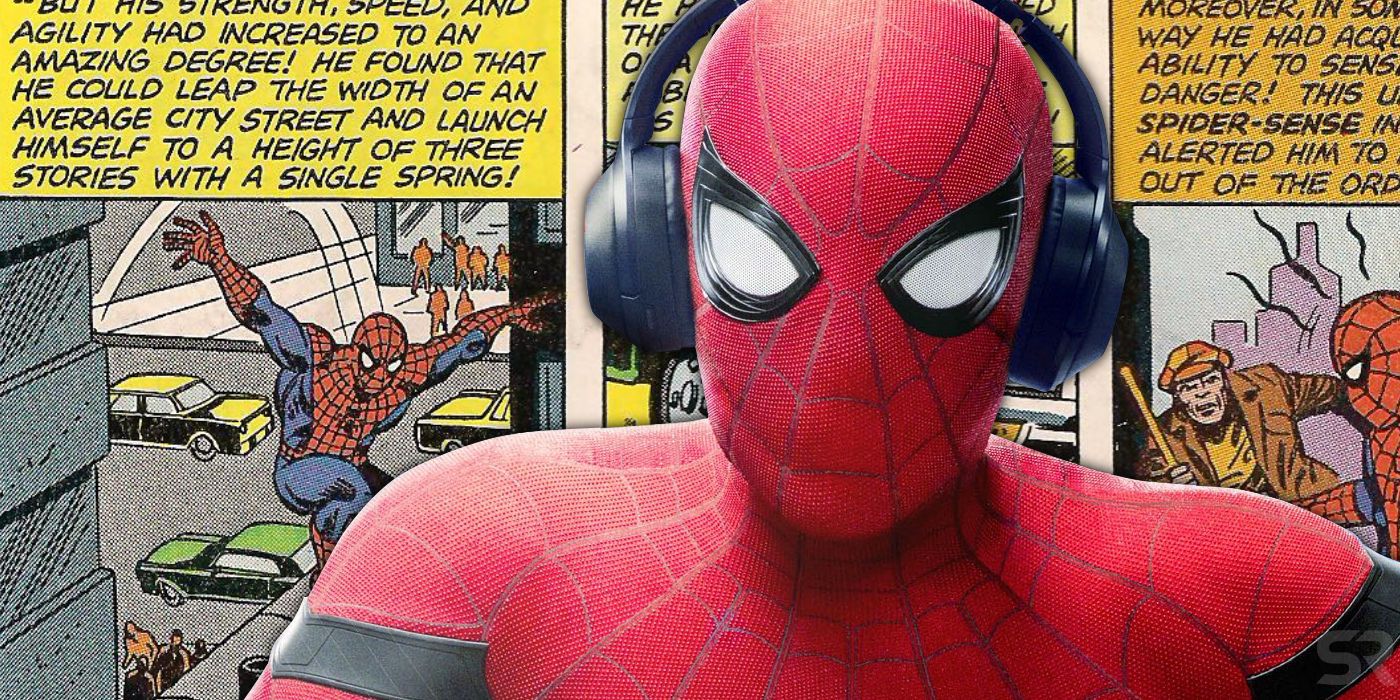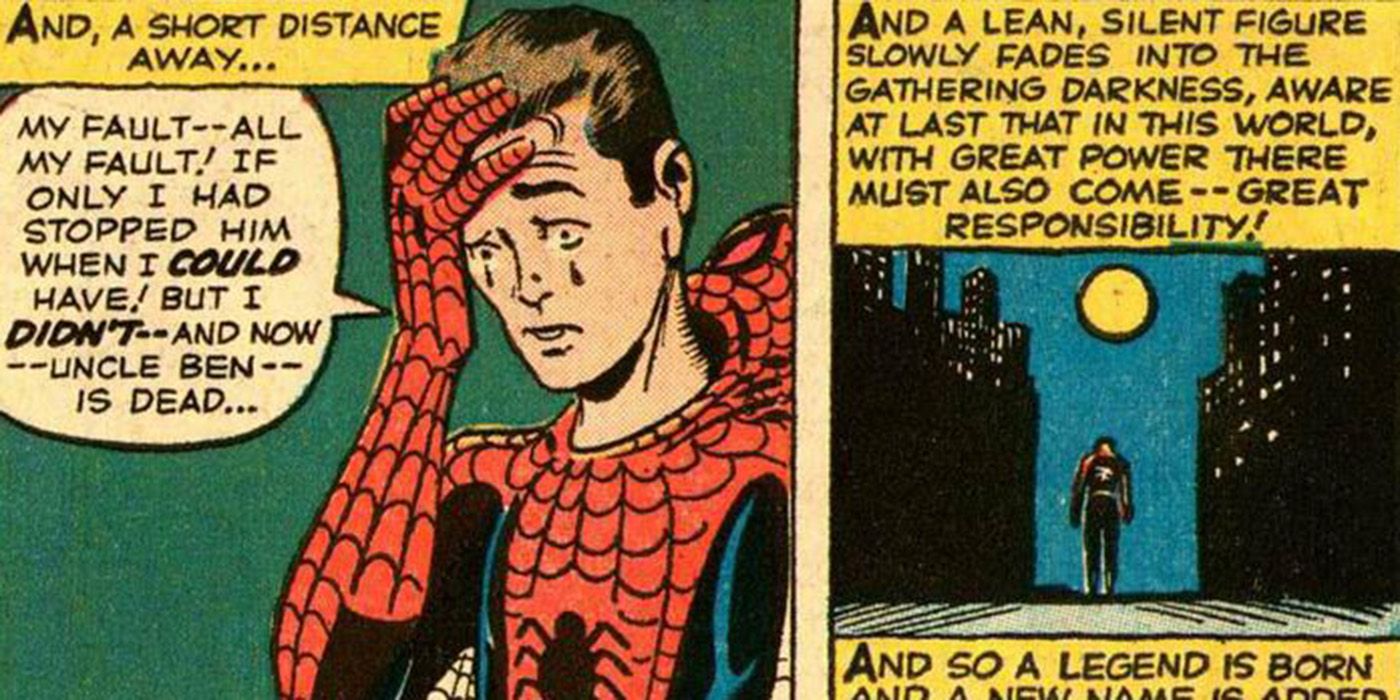Spider-Man: Homecoming 3 should finally tell the MCU origin story of Peter Parker's Spider-Man. Marvel Studios has never been particularly keen to repeat stories that have been told on the big screen before; as a result, when they struck an unprecedented deal with Sony that brought Peter Parker into the Marvel Cinematic Universe, they decided to skip Spider-Man's origin. It was a smart move, and entirely understandable, given that this story had been told twice in Hollywood blockbusters since the year 2000.
The MCU's Spider-Man was introduced in Captain America: Civil War, as a teenager who'd already had super-powers for the last few months. That meant Marvel didn't need to go over familiar ground; they didn't need to explain a radioactive spider-bite or an ill-fated Uncle Ben, because they could assume viewers were already familiar with this. Spider-Man made a brief allusion to the classic "power and responsibility" line - "when you can do the things that I can," he told Tony Stark, "but you don't, and then the bad things happen - they happen because of you." But that was about it.
Marvel and Sony have reached another agreement that has kept Spider-Man in the MCU for a little longer. Tom Holland's Spider-Man is due to return in 2021 - and it may be time for the MCU to tell his origin story after all.
Spider-Man's MCU Backstory May Not Be What You Think
The key is that everybody thinks they know how Spider-Man's origin story goes. The tale has percolated into popular culture, as well-known as the idea Superman comes from the planet Krypton or Batman lost his parents in a brutal mugging. But that very familiarity presents Marvel with a unique opportunity to subvert expectations. Indeed, in an interview with CinemaBlend, Kevin Feige hinted that Marvel has planned a few surprise twists.
"The truth is, we want audiences to bring their own... let them fill in those blanks right now. They've seen the other films. They've read comics. They can fill that in. That was a very purposeful decision we made to not retread that ground. There are little things that are said here and there that people can read into. What the specific facts are in the past, we don't... we haven't revealed yet."
The possibilities are perfectly illustrated by casting an eye to the comics, where Spider-Man's origin has actually been rewritten or retconned many times. In Stan Lee and Steve Ditko's original version, the irradiated spider bit Peter Parker and then died; more recent retcons have established that it survived and bit another student, Cindy Moon, who's now become the superhero called Silk. Another arc has suggested there was a mystic element to all this, and that Peter Parker is really a "Spider Totem," connected to the Web of Life and Destiny.
In the modernized Ultimate Comics universe, a genetically modified spider escaped and bit Peter, granting him powers; that meant there were other transformative arachnids out there, with one of them being used by corrupt businessman Norman Osborn to splice his own genes. These examples indicate just how much potential is hidden in Spider-Man's untold MCU origin, but it's worth remembering that Marvel could even choose to take a completely different approach, weaving their Spider-Man's background into the ongoing narrative of the MCU.
Spider-Man 3 Could Be Marvel's Last Chance To Tell This Tale
Unfortunately, if there is indeed a reason for Marvel's secrecy, it looks as though the clock is ticking; Spider-Man: Homecoming 3 could be their last chance to reveal it. The relationship between Marvel Studios and Sony Pictures briefly broke down earlier this year, and Marvel almost lost Spider-Man from the MCU altogether; it took Tom Holland's personal intervention to bring the two studios back to the negotiating table. And, although this is great news, this new Marvel-Sony deal appears to come with a time limit. There'll be a third solo Spider-Man film, due out in July 2021 and bringing an end to the trilogy; and it will be followed by another mystery Marvel movie.
At this stage, it's unclear what will happen when this new agreement has expired. There have been unsubstantiated reports that Marvel plan to write Spider-Man out of the MCU; Kevin Feige has obliquely hinted that Spider-Man could even jump universes at the end and become a Sony property, perhaps implying the mystery event movie could be some sort of "Secret Wars" or "Spider-Verse." If that's the case, then Marvel can't delay any more; it's time for them to show their hand.
Spider-Man: Far From Home Could Have Set This Up
Fortunately, in narrative terms, Spider-Man: Far From Home set this up perfectly. Most of Marvel's post-credits scenes are subtle teases of things to come, but in the case of Spider-Man: Far From Home, the post-credits were the biggest chance in Spider-Man's status quo in cinematic history. Spider-Man had triumphed against Mysterio, and he was preparing to step up his game and become a hero on a whole new scale; and then, the rug was pulled out from under his feet when he saw a news broadcast from the Daily Bugle that revealed his secret identity the world - and framed him as responsible for Mysterio's crimes. There's not really any direct comic book equivalent for this arc, meaning the MCU is blazing a new trail, but one thing's for sure; the entire planet will want to know how a fifteen-year-old got super-powers.
This is an incredible opportunity to retroactively explore Spider-Man's MCU origin, and indeed to reveal its implications. As an example, in the Ultimate Universe, OsCorp realized that one of their genetically modified spiders was responsible for creating Spider-Man, and it prompted a flood of genetic experimentation. Perhaps this could even explain how some of the Spider-Man villains already introduced into the MCU gain super-powers and become a true threat to the wall-crawler; the Scorpion was introduced in Spider-Man: Homecoming, but as yet he grants the powers from the comic that make him a devastating spider-hunter. But if a genetically modified spider granted Peter Parker his abilities, couldn't a similarly genetically modified scorpion give Mac Gargan his own? And the great thing about this idea is that the genie can never be put back in the bottle; even should the Marvel-Sony deal end, the MCU will still potentially have brand new ways to create super-soldiers.
That's only an illustrative example, demonstrating the potential implications of Spider-Man's MCU origin story now it's been set up by Spider-Man: Far From Home. It's time for Marvel to finally reveal what they had planned all along - and prove that you can go back to the beginning in order to go forwards.










